Sometimes you need some practical advice to make daily living just a little bit easier. That’s why we asked our Gannon Knights what tips and tricks – what we like to call “life hacks” – they’ve found that are just too good not to share. We learned how to...
Make the Most of Your Travels
Meagan Gania, director of Learning Abroad and International Academic Programs
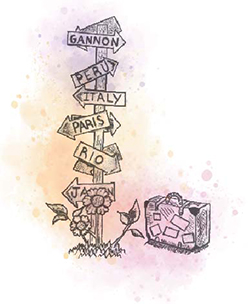 Establish a budget. Airbnbs, hostels, trains, budget airlines and resources like Expedia are huge money savers. Do your research. Feel prepared and confident on a trip by seeking resources like “Culture Smart!” Take the road less traveled. Capital cities are great, but look for less touristy spots to get a feel for the culture and interact with locals. Traveling by train? Skip the direct train and take the local one to get a real taste for the country. Stick to a plan. Plan your days ahead of time to help you maximize your experience. Pack lightly. Choose clothing that can be worn multiples times and combined to make different outfits.
Establish a budget. Airbnbs, hostels, trains, budget airlines and resources like Expedia are huge money savers. Do your research. Feel prepared and confident on a trip by seeking resources like “Culture Smart!” Take the road less traveled. Capital cities are great, but look for less touristy spots to get a feel for the culture and interact with locals. Traveling by train? Skip the direct train and take the local one to get a real taste for the country. Stick to a plan. Plan your days ahead of time to help you maximize your experience. Pack lightly. Choose clothing that can be worn multiples times and combined to make different outfits.
Say No
Melanie Gustafson-Ropski, associate teaching professor of biology, director of pre-health advising program, and director of medical laboratory science
It’s okay to say no. People will ask you to do a lot, and you’ll feel obligated to do everything. For whatever reason, you’ll feel guilty if you don’t say yes. If COVID-19 has shown me anything, there is not enough time in a day to do it all. Stress is not fun. For better mental health, just say no.
Capture Family Memories
Matt King, university media producer and digital content manager
Capture the details of the subject whether it be children, wife, nieces, nephews, etc. Focusing on detail means focusing on what individuals are doing as opposed to the entire subject, which can take away from the story the image is trying to tell. Small details are big parts of their memories. Think about composition, which is how things are arranged. Think about using a different perspective, it can make the image more unique and special. Keep personalities in mind for some “real” shots. Try not to force anything; the moments in between your shots often make for the best photos. Talk about things that naturally make the subject smile. It will make them become comfortable and when the moment comes, they will be relaxed and natural. Use places where you’ve made some of your best memories to tell a story about your life. You could even play music during a shoot to bring some of these memories to life.
Create Meaningful Cross-cultural Connections
Abdulmohsen Alamri, graduate engineering management student, and Mariana Syrotiak, director of the Office of English Language and Global Training
 Two factors contribute to making meaningful connections: sincere interest and acknowledgment of one another as human beings. Invite someone gently into conversation and show genuine interest in an item they’re wearing, for example. Ask questions. Don’t interrupt or try to interpret what the other person is saying based on your point of view. Don’t show off your knowledge of the country or culture; you may run the risk of stereotyping. All this can be avoided by replacing judgment with curiosity.
Two factors contribute to making meaningful connections: sincere interest and acknowledgment of one another as human beings. Invite someone gently into conversation and show genuine interest in an item they’re wearing, for example. Ask questions. Don’t interrupt or try to interpret what the other person is saying based on your point of view. Don’t show off your knowledge of the country or culture; you may run the risk of stereotyping. All this can be avoided by replacing judgment with curiosity.
Think Outside the Box
Aaron Kerr, Ph.D., associate professor of philosophy
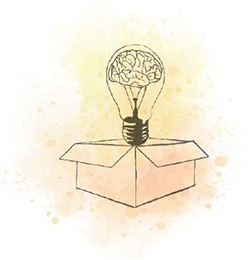 Sometimes using a visual helps when we think philosophically. For instance, I draw a cube and say, “This is a symbol for an idea, experience, event or reality.” You cannot see all sides, but you know they are there. You may have to do some mental calisthenics to get to them, but that’s what philosophy is about. Say the cube is health. There are six sides to the cube and to health: mental, physical, financial, social, communal and public. Each side has many aspects. Depending on your angle of vision, experience or knowledge, you can describe the aspects of each side. You notice the cube is one. There is one “wellness” that has many sides and aspects that are all interconnected. Suddenly you realize that you know an awful lot more than you first thought. That’s how you think outside the box – or the cube.
Sometimes using a visual helps when we think philosophically. For instance, I draw a cube and say, “This is a symbol for an idea, experience, event or reality.” You cannot see all sides, but you know they are there. You may have to do some mental calisthenics to get to them, but that’s what philosophy is about. Say the cube is health. There are six sides to the cube and to health: mental, physical, financial, social, communal and public. Each side has many aspects. Depending on your angle of vision, experience or knowledge, you can describe the aspects of each side. You notice the cube is one. There is one “wellness” that has many sides and aspects that are all interconnected. Suddenly you realize that you know an awful lot more than you first thought. That’s how you think outside the box – or the cube.
Hunt For Beach Glass
Meagan Loibl, assistant director of leadership development, leadership Development and Campus Engagement
Scope out some secluded stretches of beach along Lake Erie or any other body of water that is large enough to have frequent water vessel traffic. Typically, the harder to get to, the better the findings. Wait for a big storm or very windy day and set your alarm for early the next morning. The bigger waves will stir up some long-lost treasures. The earlier you get there, the better chance you have at finding them first. Walk up and down your stretch of shoreline, looking for pops of color or extra shiny “rocks.” Pick up whatever looks like it doesn’t belong, inspect and pocket the pieces you find. Don’t forget to step away from the current shoreline and scope out the drier upper areas. The water used to be higher than it is now and these pieces get overlooked. Display your findings in your favorite clear vase or put them to creative use in whatever craft you find online.
Stay Safe from Online Scams
Mark Jordano, chief information officer of Information Technology Services
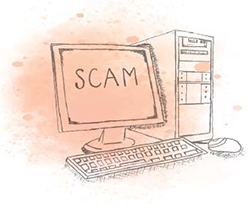 Online scams attempt to trick people into giving personal information like credit card numbers, passwords or Social Security numbers, or sending money or difficult-to-trace “currency” like gift cards. These scams often use “spoofed” or fake emails, websites or social media profiles and create a sense of urgency (your loved one will go to jail, my child is sick, etc.) to get you to act without fully thinking through the consequences. Always be suspicious of unsolicited emails, calls or social media messages. Find another way to validate the message or simply don’t respond. Never respond to an online request with personal information or any sort of payment. Organizations you do business with already know your account information, and no legitimate business will request payment in iTunes gift cards. Never click links in a suspicious message. Ignore and delete. Always keep your password and personal information private.
Online scams attempt to trick people into giving personal information like credit card numbers, passwords or Social Security numbers, or sending money or difficult-to-trace “currency” like gift cards. These scams often use “spoofed” or fake emails, websites or social media profiles and create a sense of urgency (your loved one will go to jail, my child is sick, etc.) to get you to act without fully thinking through the consequences. Always be suspicious of unsolicited emails, calls or social media messages. Find another way to validate the message or simply don’t respond. Never respond to an online request with personal information or any sort of payment. Organizations you do business with already know your account information, and no legitimate business will request payment in iTunes gift cards. Never click links in a suspicious message. Ignore and delete. Always keep your password and personal information private.
Curate Work-Life Balance and Keep Your Soul Happy
Julia Hawkins-Pokabla OTD, OTR/L, assistant professor of occupational therapy
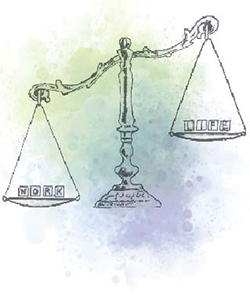 Take one moment at a time and be mindful. Do at least three things each day - something for work, something for you and something for someone you love. Be grateful for at least three things. Be grateful to be alive. Be grateful for one good friend. Be grateful you are the special person you are.
Take one moment at a time and be mindful. Do at least three things each day - something for work, something for you and something for someone you love. Be grateful for at least three things. Be grateful to be alive. Be grateful for one good friend. Be grateful you are the special person you are.
Follow The Golden Knights
Kelly Bommer, business and special projects manager in Gannon Athletics
Of the 365 days in a year, you can catch Gannon Athletics in action more than 190 of them! Follow along with all the action by following @GUKnights on Twitter, @gannongoldenknights on Instagram or Gannon University Athletics on Facebook. Each team also has separate accounts that post specific to their sport. We hear the virtual cheers!
Send Great Mail
Jessica Hartnett, associate professor of psychology
I am really good at sending mail. I’m not so good at remembering the last four digits on area codes but am good at sending mail to remind my dear and lovely people that someone is rooting for them in this world. Cards are lovely, but wee tiny gifts that fit in envelopes are lovelier. They also make Gannon interoffice mail far merrier. Here is my list of things to keep on hand to send to friends who may need a smile:
- Individual servings of instant coffee
- Instant chai lattes
- Fake mustaches
- Pop rocks
- Lume individually wrapped deodorant wipes
- 3D pop-up stickers from StickerPop
- Really good tea. I recommend Traditional Medicinal’s Throat Coat Tea
- Single-use, individually wrapped monocles
- Paper binoculars (just Google it)
- Participation ribbons
- Balloons (uninflated, especially good for friends with kids aged nine and under)
- Mini foam fingers (again, Google it)
- HotHands hand warmers (some of my friends live in the North)
- Wegman’s fruit strips
Create Healthy, Active Habits
Mckenna Haskins, wellness coordinator at the Gannon Recreation and Wellness Center
Take a group fitness class at the Recreation and Wellness Center. They’re free to all students, faculty and staff. Group Fitness classes are a great way to increase your physical and social wellness. Take 30 minutes out of your day to do something active: go for a walk, do some body weight exercises, play a sport, clean your house, etc. Daily activity can be broken up into 10-minute increments to reach your 30 min/day goal. Try a standing desk, bike desk or treadmill desk to be active while also getting your work/studying done. Take the stairs instead of the elevator. Start with doing this a couple times a week and work your way up to doing this every time. Schedule walking meetings with your peers or coworkers. Use the indoor track during the winter and take in the bay views during the warmer months. Check in with yourself and your wellness to see which areas may need some fortifying. Try something new to increase your physical, emotional, spiritual, occupational, social, environmental and intellectual wellness.
Properly Enjoy Your Oreo Cookie
Charmaine Wilson, director of McNair Scholars Program
The Oreo cookie lasts longer if you choose not to dunk it in a nice cold glass of milk. However, for those who choose to dunk the cookie, take seven to 10 seconds to admire the artistic layers of the cookie. Slowly, untwist the top cookie layer. If done correctly, no cream should be present on the cookie. Eat half the cream-less cookie. Once completed, dunk the remaining cream-less cookie into the milk for five seconds before enjoying the remaining cream-less cookie.
Drink half the glass of milk before dropping your remaining cookie into the milk. This will allow you to scoop it out using your fingers or, if you are dainty, use a spoon. Enjoy.
Make Difficult Decisions
Emily Muntean, assistant director of Campus Ministry
 Have the courage to do the right thing. If you are choosing between good options, begin with gratitude for the opportunity to explore different paths. If time allows, live for a day or two as though you have made the decision final. See how you feel about it and how it impacts your daily life. Consider if you have a sense of peace about your decision. The more peace you feel, the more likely that it is the best fit.
Have the courage to do the right thing. If you are choosing between good options, begin with gratitude for the opportunity to explore different paths. If time allows, live for a day or two as though you have made the decision final. See how you feel about it and how it impacts your daily life. Consider if you have a sense of peace about your decision. The more peace you feel, the more likely that it is the best fit.
Stay Centered in Stressful Times
Alyson Eagle, LPC, MS, NCC, manager of Campus Health Initiatives – COVID-19
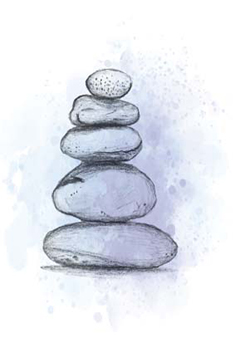 Experiment, try new things and engage in new activities that help you find peace and ease your mind, body and spirit amid uncertainty. Browse the app store for mindfulness, gratitude or meditation practices. Aromatherapy and essential oils have wonderful healing and grounding properties. It is equally as important to stay connected to your community. When in doubt, lean on your loved ones. Remember: you are enough, and you will get through this.
Experiment, try new things and engage in new activities that help you find peace and ease your mind, body and spirit amid uncertainty. Browse the app store for mindfulness, gratitude or meditation practices. Aromatherapy and essential oils have wonderful healing and grounding properties. It is equally as important to stay connected to your community. When in doubt, lean on your loved ones. Remember: you are enough, and you will get through this.
Give Platelets And Plasma
Almi Clerkin, major gift officer in Gannon University Advancement
As caring people, we strive to help others. One of the best things we can do is donate blood. Some of us can even give platelets and plasma. A super platelet count (more than 200,000), great veins and time to give are the criteria. Platelets are used to help trauma patients, people with cancer, and people having surgery. A single unit of platelets helps one adult or can be used to help up to five infants. Some donors can even give a double unit. I have donated 63 units since 2017, and it feels great every time. Make an appointment with your local blood bank to discuss your options. You will feel great you did.
Keep Art In Your Life
Angela Howell, assistant professor of theatre
Art is life. How do you even breathe without it? There is art in everything and nothing. It doesn’t have to be something big and fancy or dramatic; it just needs to be something carefully and thoughtfully made that is noticed and appreciated by someone. Look at piece of art, listen to a new song, read something or watch something. Take 10 minutes to consume art every day and see if it makes you feel better. Buy a ticket to a local show instead of staying on the couch. Better yet, buy season tickets somewhere and schedule a year’s worth of prepaid commitments to put on pants with a waistband and do your hair and be entertained. Take a leap and try out an art form you know nothing about. Feel free to hate it, love it, not understand it, or appreciate it for what it is. Draw or paint something for fun with no intention of displaying it. Dance even if you suck. Write even if you suck. Be okay with being bad at something, but enjoy the process. Play the piano or any instrument you can find – even if you don't know how – for 15 minutes. Sing at the top if your lungs – from a rooftop if possible. Use art as a verb. Art every day. Never say that you aren’t creative.
Visit Yellowstone
Steven Ropski, Ph.D., professor of biology
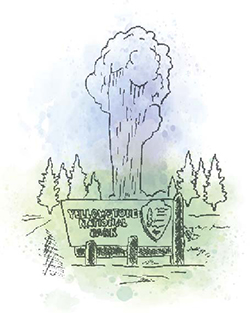 How lucky we are in the United States to have the best national park system in the world and the first national park in the world too: Yellowstone. Europe has its architecture and art; we have our natural cathedrals of unmatched beauty. As some would say, this was America’s best idea. Visit them!
How lucky we are in the United States to have the best national park system in the world and the first national park in the world too: Yellowstone. Europe has its architecture and art; we have our natural cathedrals of unmatched beauty. As some would say, this was America’s best idea. Visit them!
Maintain A Professional Presence Online
Nicole Lossie, social media and digital engagement manager
Your online presence is anything about you that is visible online: social media profiles and channels, photographs, anything written by or about you including discussion boards, forums, blogs or articles. It’s important that you’re aware of this digital footprint and work to maintain it, because personal information and data is observed by companies who market goods and services, clients and possible employers and others in your ecosystem. Find out what your online presence says about you by searching your name on Google, social media, or setting up a Google Alert with your name. What can you do to improve it? Build a positive presence showcasing your skills, write articles and engage with industry-relevant content, and control what information you post publicly vs. what is private. Overall, keep everything up to date, make yourself accessible (if looking for employment), and stay true to yourself.
Establish Growth Opportunities
Julia Mack, Ph.D., assistant professor of criminal justice
Organizational success is dependent on a forward-thinking team that shares a common vision.
Evaluate your team’s strengths to use as leverage when pursing opportunities. Research societal needs, consumer wants and competitor shortcomings, and then evaluate how your current team can fill those voids. Once identified, ensure current team and broader organization is on board with pursuing the new opportunities. Recruit additional members who support the shared vision and broaden the team’s strengths.
Overcome Our Racial History
Parris Baker, associate professor or mortuary science and social work programs
- To overcome our racial history Americans must first learn our racial history (David Von Drehle).
- The most urgent, the most disgraceful, the most shameful and the most tragic problem is our silence. America must not become a nation of silent onlookers (Rabbi Joachim Prinz).
- Become an Agent of Hope; an Activist for institutional change, and an Advocate with folks whose voices have been muted.
- Lift Every Voice sing til’ My Country tis of Thy becomes the sweet land of liberty.
- Don’t let the lion tell the giraffe’s story (Nigerian Proverb)
Follow Solid Life Advice
MC Gensheimer, co-director of the School of Communication and the Arts, digital and new media
When in doubt or in a funk, make something. Give a little bit of something to anyone who asks. Go to garage sales, auctions, and thrift shops; the “under-market” is a colorful, inspirational place. Listen more than you talk, and ask questions. Always say “thank you.” Gratitude is an important practice.
Maintain Consistency with a Fitness Routine
Dianna Lunsford, OTD MEd, OTRL CHT, associate professor and program director of the Occupational Therapy Doctorate program
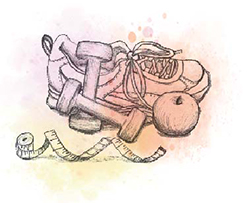 Focus on one small change at a time. Begin with walking three days a week at a comfortable speed and duration and increase as you get stronger.
Focus on one small change at a time. Begin with walking three days a week at a comfortable speed and duration and increase as you get stronger.- Associate your routine with a good feeling. Instead of dreading it, tell yourself how awesome you will feel when you are finished.
- Have an accountability partner – someone who has the same or similar goals in mind and who will support and not deter you.
- Reward your consistency with words of affirmation on a regular basis.
- Don’t villainize food. Think about “moderation and lifestyle” instead of “indulging and diet.”
- Do your workouts at the time of the day that best suits you. If that happens to be in the morning then wear your workout clothes to bed so you can get up and go.
- Do a workout that suits you. If you hate cross-fit, try dance or something else that you are excited to participate in.
- Have a plan and show up even if you don’t feel like it. Engaging at 50% effort is better than 0%.
- Set up what you need to be successful. If you pack a bag for the gym, you can’t use it as an excuse to not go.
- Find joy in muscle soreness, reaching your goals and moving your body!
Get Your Point Across
Jennifer Allen Catallier, associate professor and director of strategic communication
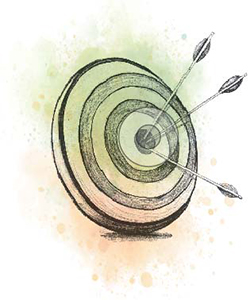 Be clear and concise. More detail is not always better. We have a tendency to want to overexplain when we are trying to persuade, but this can backfire if your message gets lost in all the detail. Also, know your audience. Provide information that is most appropriate and relevant to your listener.
Be clear and concise. More detail is not always better. We have a tendency to want to overexplain when we are trying to persuade, but this can backfire if your message gets lost in all the detail. Also, know your audience. Provide information that is most appropriate and relevant to your listener.
Stay Current, Without Doom-scrolling
Jeff Bloodworth, Ph.D., professor of history and co-director of the School of Public Service & Global Affairs
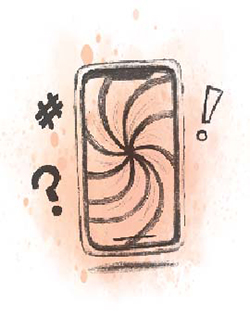 First, no cable news. All have bias to make stories melodramatic so you will continue to watch and programmers can rake in advertising dollars. Do not venture into the comment section. Remember, social media is for pictures of puppies, grandchildren and vacations… and maybe sports. That’s it. Now, find a smart writer or podcaster from a different political perspective and read or listen to them regularly. Thinking is like physical exercise; you need a bit of discomfort to grow. Finally, breathe. America and the world have endured tougher times. Somehow, better days are ahead.
First, no cable news. All have bias to make stories melodramatic so you will continue to watch and programmers can rake in advertising dollars. Do not venture into the comment section. Remember, social media is for pictures of puppies, grandchildren and vacations… and maybe sports. That’s it. Now, find a smart writer or podcaster from a different political perspective and read or listen to them regularly. Thinking is like physical exercise; you need a bit of discomfort to grow. Finally, breathe. America and the world have endured tougher times. Somehow, better days are ahead.
Get Your Health And Fitness Goals On Track
JD Mosinski, associate professor of sport and exercise science
Take it one day at a time and one step at a time. Did you miss a workout or fall off a healthy eating plan? Just start again the next day. There is no perfect workout program or diet. Do whatever you think you can maintain. What is more important is that you just go and do it. Identify your barriers to physical activity and healthy eating. When you know them they become easier to overcome. Find your source of accountability. For some people this is posting to social media. For others it is taking daily progress pictures and journaling, and some may just need a friend to discuss their journey with. Saying things out loud and sharing it with other people creates a contract which can help keep you accountable to your goals. Do everything in moderation. Sometimes you need to eat the pizza or watch Netflix from your couch. Just don’t do it every single day.
Make Connections In An Increasingly Digital World
Erin Hart, Director, career exploration and development
In the last two years, Covid-19 has pushed career fairs, networking events, interviews, birthday parties and even first dates into the virtual realm, making the ability to connect organically and authentically difficult. Before passing up the next virtual event, think about your goals and reasons for initially wanting to attend. Establishing what you hope to get out of a virtual engagement up front will help you approach the event with clarity. Next, think about the attitude in which you want to show up. This will help set the tone for your presence and allow you to authentically engage. Remember that humans are social by nature, and we all want to feel validated and accepted.
Practice Safety
Jon Habursky, assistant director of Campus Police and Safety
Know how to contact the university police. Know the emergency telephone number for your university police department. Gannon’s police can be contacted at 814 871-7777 or via the LiveSafe App. Learn where the Blue Light callboxes are located. Gannon’s LiveSafe app is also a walking Blue Light. Subscribe to the campus mass notification system.
Walk around campus safely: Familiarize yourself with the layout of the campus. Survey the campus while classes are in session and after dark to see that academic buildings, walkways, facilities, and parking lots are adequately secured and well-lit. Plan the safest route to your destination; choose well-lit, busy pathways and streets. Use the Knight Watch shuttle services at night. Stay alert to your surroundings and the people around you. Walk with a confident stride; keep your head up and look around and do not wear ear buds.
Stay safe in the residence halls. Always lock your door and window(s). Do not allow strangers to enter your room or your residence hall. Do not prop any exterior doors open to allow unescorted visitors into the residence hall. Report any malfunctioning locks, doors or windows to your residence life staff. Tell a roommate or friend if you are planning to be away overnight or for a few days. Report any suspicious persons or activities in or near your residence hall to your residence hall staff and University Police. Secure your valuables and engrave expensive items with identifying information. Do not leave your identification, keys, wallets, or other valuables in open view.
Streamline Your Processes
Nick Devine, design and fabrication engineer
- Challenge your requirements. Every engineering problem comes with a list of requirements. Students are taught to answer only the questions being asked and not to challenge whether the question is worth asking. For real-world problems, sometimes the best course of action is to challenge the requirements to determine if they are truly needed.
- Try to delete a process or part. Most people overcomplicate a design to cover every “what if” possibility. This leads to projects that can be overly complex and ineffective. Often the most efficient solution is to eliminate the process or part from the design.
- Optimize the design. Usually, people try to do this step first, but to effectively streamline your engineering process this should be moved to the final step. By following the prior two steps, you avoid the possibility of wasting time working on unnecessary parts. As Elon Musk says about his SpaceX team, “One of the biggest traps for smart engineers is optimizing something that shouldn’t exist.”
Avoid “Crap” On The Internet
Jessica Mando, digital collections librarian
Use the C.R.A.P. test. Created by Molly Beestrum, the C.R.A.P. test is a handy tool to decide if the information you’re finding is credible:
Currency: the information should be current. How recent is the information?
Reliability: is the content reliable? Primarily an opinion? Balanced? Does the content include sources for data or quotes. And do those sources pass the CRAP test?
Authority: who is the creator and what are their credentials? Who is the publisher or who sponsored the research? Are they trustworthy? Is it peer-reviewed? Are there advertisements on the websites, and if so, are they clearly marked?
Purpose/Point of view: who was this created for? Is it unbiased and free of emotion? What are the creator’s intentions? Does the creator seem to be pushing an agenda or a particular “side?” Is the creator trying to sell you something, and if so, is it clearly stated?
A well-informed population is crucial to a functioning society. To stay well-informed, you need a good C.R.A.P. detector.
Submit A Class Note
Gannon University Advancement
We want to share your good news whether you’ve gotten a promotion, celebrated a birth in your family, accomplished a major personal project, won an award and more. Our Gannon alumni are doing amazing things and want to share your news with the Gannon family. To submit a class note and read more from your classmates, email gannonalumni@gannon.edu. You can also visit www.gannon.edu/alumni click Alumni Association, and then select Class Notes. Submissions appear in the alumnotes section of the Gannon Magazine, Gannon social media and the monthly alumni newsletter.
Edited by Nicole Lossie ’11, social media and digital engagement manager.
Artwork by Matthew King, university media producer and digital content manager; and Laura Giannelli, assistant director for marketing and creative strategist.